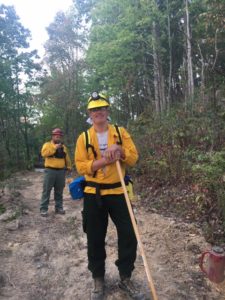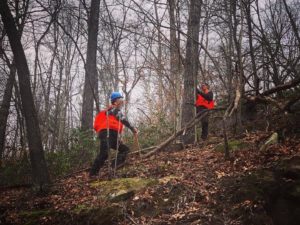MICHAEL RICH PURSUES CHANGE IN ACADEMIC CAREER FOCUS FROM ASIAN STUDIES TO HOW FORESTS WORK
The third installment in our new series – In Their Own Woods: Sketches of Kentucky Woodland Owners – presents a little different profile of family forestry. Dr. Christopher Michael Rich, currently an Associate Professor of Chinese and Japanese at Eastern Kentucky University, is pursuing a forestry degree at the University of Kentucky and a possible career change in that direction. The complexity of forest systems and the community of like-minded people with whom he is now involved is fulfilling a missing aspect of his knowledge in caring for the planet and the many services a forest provides. Michael also serves on the KWOA board of directors.
Feeling like an overgrown idiot surrounded by eager 18 year olds, I waited in the lobby of the Ag North building for my advising session with Dr. John Lhotka to begin an undergraduate degree in Forestry at University of Kentucky. The decision to begin a forestry degree was gradual, beginning with me telling everyone I talked to that I was going to do it. But unable to take the leap in quitting my job as an Associate Professor of Chinese and Japanese at EKU to become a full-time student, I merely told people of my plans to do it “someday.” I had good conversations with Dr. Keiko Tanaka, Dr. Laura Lhotka, Dr. Mary Arthur, NRES Academic coordinator Geri Philpott, Billy Thomas, and Dr. Mark Williams, trying to see if this was really a feasible path. Everyone I spoke with was encouraging, and seemed more convinced than me that this was a realistic plan. So, suppressing a sense of ridiculousness, I went ahead with the process of applying to UK and ordering transcripts for transfer credits from my now 35 year old previous undergraduate degree in Asian Studies. Fortunately, Dr. John Lhotka came up with a plan whereby I could study part-time, and make use of an upcoming sabbatical to put in a full-time year as a student, and make gradual progress in getting the degree without jumping straight off the 10m diving board. Still, I could hardly believe it when UK actually issued me a student id.
Feeling like an overgrown idiot surrounded by eager 18 year olds, I waited in the lobby of the Ag North building for my advising session with Dr. John Lhotka to begin an undergraduate degree in Forestry at University of Kentucky. The decision to begin a forestry degree was gradual, beginning with me telling everyone I talked to that I was going to do it. But unable to take the leap in quitting my job as an Associate Professor of Chinese and Japanese at EKU to become a full-time student, I merely told people of my plans to do it “someday.” I had good conversations with Dr. Keiko Tanaka, Dr. Laura Lhotka, Dr. Mary Arthur, NRES Academic coordinator Geri Philpott, Billy Thomas, and Dr. Mark Williams, trying to see if this was really a feasible path. Everyone I spoke with was encouraging, and seemed more convinced than me that this was a realistic plan. So, suppressing a sense of ridiculousness, I went ahead with the process of applying to UK and ordering transcripts for transfer credits from my now 35 year old previous undergraduate degree in Asian Studies. Fortunately, Dr. John Lhotka came up with a plan whereby I could study part-time, and make use of an upcoming sabbatical to put in a full-time year as a student, and make gradual progress in getting the degree without jumping straight off the 10m diving board. Still, I could hardly believe it when UK actually issued me a student id.
My first real course at UK was in wildland fire, a blended course of online assignments, class meetings, and field days. I enjoyed getting to know the students in class, and the highlight was a field day near Cave Run Lake hand digging a fire line, practicing jumping into fire shelters, laying out hoses and learning the names of connectors, and learning how to use a fire torch on a frigid March day. This began the process of getting to know the many other non-traditional students in the program, and gaining confidence in a new role as a student rather than professor. Being accepted into the Fire Cats, a UK program where students worked as actual wildland firefighters, added a sense of reality to the process of embarking on a new path in my career.
I began full-time coursework at UK in Fall 2019 and was relieved at how friendly and helpful the faculty and fellow students were. Some of the students had long careers in the military and were similarly trying to change career directions. Even many of the younger students had started their college studies in different fields, but then changed to forestry. Everyone had a personal story about what propelled them to decide on forestry, and our common interest and commitment to forestry created a real feeling of solidarity, especially in our more challenging classes. One of the most famous and difficult classes in the forestry program is dendrology, and spending four hours every Friday afternoon in the blistering heat of last fall learning about trees, and doing tree id quizzes and exams led to wonderful conversations and cooperation on learning strategies. Working in groups to measure trees in the arboretum for stats class reminded me of rowing crew in college – the combination physical endurance and attempting to gain new skills created a wonderful group bonding experience.
I began full-time coursework at UK in Fall 2019 and was relieved at how friendly and helpful the faculty and fellow students were. Some of the students had long careers in the military and were similarly trying to change career directions. Even many of the younger students had started their college studies in different fields, but then changed to forestry. Everyone had a personal story about what propelled them to decide on forestry, and our common interest and commitment to forestry created a real feeling of solidarity, especially in our more challenging classes. One of the most famous and difficult classes in the forestry program is dendrology, and spending four hours every Friday afternoon in the blistering heat of last fall learning about trees, and doing tree id quizzes and exams led to wonderful conversations and cooperation on learning strategies. Working in groups to measure trees in the arboretum for stats class reminded me of rowing crew in college – the combination physical endurance and attempting to gain new skills created a wonderful group bonding experience.
This spring I had the opportunity to participate in the field semester, much of which took place in Robinson Forest. Three grueling days in pouring rain measuring trees up and down the steep slopes of Eastern Kentucky were relieved by delicious meals prepared by Neva and Erwin Williams, and time around the campfire singing along to guitar accompaniment of faculty and students. Unfortunately, Covid-19 has put a (temporary?) hiatus on our field semester, although we will try to continue with online studies to complete our semester. A tour of wood industries from saw mills, barrel makers, kiln driers, chip makers, and creators of precision custom cabinetry components also exposed me to the depth and importance of the wood industry in Kentucky.
Although I have enjoyed backpacking, farm work and other outdoor activities my entire life, I had never considered forestry as a career. My academic career focused on languages, cultures and literature. I have been amazed at the complexity of soil science, silviculture, forest measurement, and carbon and nitrogen cycles in forest systems. I feel like I am filling in a missing aspect of my knowledge in trying to care for this planet, not just as a teacher trying to help students, but as a student of the forest trying to help it continue to provide us with all the services a forest provides. Belonging to organizations like the KWOA and attending Woodland Owner Short Courses have also introduced me to a community of like-minded people interested in doing the best for our woodlands. While I still have no idea of when I will be able to graduate, and indeed what career this may lead to, I am grateful to have had the opportunity to deepen my knowledge about how forests work, and about the people who have dedicated their lives and careers to caring for forests.
Although I have enjoyed backpacking, farm work and other outdoor activities my entire life, I had never considered forestry as a career. My academic career focused on languages, cultures and literature. I have been amazed at the complexity of soil science, silviculture, forest measurement, and carbon and nitrogen cycles in forest systems. I feel like I am filling in a missing aspect of my knowledge in trying to care for this planet, not just as a teacher trying to help students, but as a student of the forest trying to help it continue to provide us with all the services a forest provides. Belonging to organizations like the KWOA and attending Woodland Owner Short Courses have also introduced me to a community of like-minded people interested in doing the best for our woodlands. While I still have no idea of when I will be able to graduate, and indeed what career this may lead to, I am grateful to have had the opportunity to deepen my knowledge about how forests work, and about the people who have dedicated their lives and careers to caring for forests.

